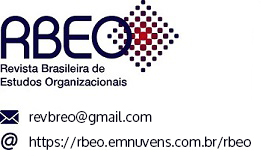MASSIVE LABOR COOPERATION IN ANDROID DEVELOPMENT: A CHANGE OR AN EXPANSION OF CAPITALIST LABOR?
DOI:
https://doi.org/10.21583/2447-4851.rbeo.2021.v8n2.390Palavras-chave:
Massive cooperation, Labor organization, Labor relation.Resumo
The productive forces development in the capitalist production model demanded intensive uses of information and communication technologies. This condition promotes the formation of new ways of labor organization and collaborates for mass cooperation process emergence in the production of digital goods. The research object was the development of the Android project, led by Google. The research was conducted following the Critical Epistemology of Concrete - CEC and following the theoretical body of the Political Economy of Power. The descriptions of the CEC research method were the basis for treatment information collected by documentary analyses, nonparticipating observations, and applied interviews. The study indicated that the labor on massive cooperation does not surpass the generator labor of surplus-value appropriate by capital, even promoting significant changes in the Marxist category Cooperation. Also, the development of capitalism continues incorporating technological elements in the labor organization and masking fundamental aspects to ensure control over the work and the extraction of surplus-value, even if apparently the labor had become more “free”. Finally, the research has shown that the classic Marxist categories are still contemporary and function to understand the reality moves in organizations.
The productive forces development in the capitalist production model demanded intensive uses of information and communication technologies. This condition promotes the formation of new ways of labor organization and collaborates for mass cooperation process emergence in the production of digital goods. The research object was the development of the Android project, led by Google. The research was conducted following the Critical Epistemology of Concrete - CEC and following the theoretical body of the Political Economy of Power. The descriptions of the CEC research method were the basis for treatment information collected by documentary analyses, nonparticipating observations, and applied interviews. The study indicated that the labor on massive cooperation does not surpass the generator labor of surplus-value appropriate by capital, even promoting significant changes in the Marxist category Cooperation. Also, the development of capitalism continues incorporating technological elements in the labor organization and masking fundamental aspects to ensure control over the work and the extraction of surplus-value, even if apparently the labor had become more “free”. Finally, the research has shown that the classic Marxist categories are still contemporary and function to understand the reality moves in organizations.
Downloads
Referências
Brabham, D. C. 2008. “Crowdsourcing as a Model for Problem Solving: An Introduction and Cases.” Convergence: The International Journal of Research into New Media Technologies 14 (1): 75–90. doi:10.1177/1354856507084420.
Chesnais, François. 1996. A Mundialização Do Capital. São Paulo: Xamã.
Deskmag Magazine. 2010. “The History Of Coworking.” http://www.tiki-toki.com/timeline/entry/156192/The-History-Of-Coworking-Presented-By-Deskmag#vars!date=2003-10-07_00:05:27!
Faria, José Henrique de. 2004a. Economia Política Do Poder: As Práticas Do Controle Nas Organizações. Vol.3. Curitiba: Juruá.
———. 2004b. Economia Política Do Poder: Fundamentos. Vol.1. Curitiba: Juruá.
———. 2009. Gestão Participativa : Relações de Poder E de Trabalho Nas Organizações. São Paulo: Atlas. http://www.worldcat.org/title/gestao-participativa-relacoes-de-poder-e-de-trabalho-nas-organizacoes/oclc/683311363&referer=brief_results.
———. 2010. Materialismo Histórico Em Estudos Organizacionais E de Gestão: Uma Abordagem Epistemológica E Metodológica. Curitiba: EPPEO.
———. 2015a. “Tempo Dedicado Ao Trabalho E Sofisticação Dos Mecanismos de Controle Na Gestão Das Unidades Produtivas.” Curitiba: EPPEO - Economia Política do Poder e Esttudos Organizacionais. http://eppeo.pro.br/tempo-dedicado-ao-trabalho-e-sofisticacao-dos-mecanismos-de-controle-na-gestao-das-unidades-produtivas/.
———. 2015b. “Epistemologia Crítica Do Concreto E Momentos Da Pesquisa: Uma Proposição Para Os Estudos Organizacionais.” RAM. Revista de Administração Mackenzie 16 (5). Universidade Presbiteriana Mackenzie: 15–40. doi:10.1590/1678-69712015/administracao.v16n5p15-40.
Galeano, Eduardo. 2010. As Veias Abertas Da America Latina. Porto Alegre (RS): L&PM Pocket.
GOOGLE. 2015. “Android Open Source Project.” http://source.android.com/.
Harvey, David. 2014. Para Entender O Capital : Livro II E III. São Paulo: Boitempo.
Hobsbawm, Eric. 1977. Era Do Capital 1848-1875. Rio de Janeiro: Paz e Terra.
Kuenzer, Acácia. 1985. Pedagogia Da Fábrica : As Relações de Produção E a Educação Do Trabalhador. São Paulo: Cortez Editora.
Lakhani, K R, B Jeppesen, P A Lohse, and J A Panetta. 2007. “The Value of Openness in Scientific Problem Solving.” Harvard Business School. Harvard University. http://ictlogy.net/bibliography/reports/projects.php?idp=740.
Marx, Karl. 1996. O Capital : Critica Da Economia Politica. São Paulo (SP): Nova Cultural.
Postigo, Hector. 2003. “From Pong to Planet Quake: Post-Industrial Transitions from Leisure to Work.” Information, Communication & Society 6 (4): 593–607. doi:10.1080/1369118032000163277.
Terranova, Tiziana. 2000. “Free Labor: Producing Culture for the Digital Economy.” Social Text 18 (2). Duke University Press: 33–58.
United Nations Development Programme. 2016. Human Development Report 2016: Human Development for Everyone. New York: United Nations Development Programme. http://www.undp.org/content/undp/en/home/librarypage/hdr/2016-human-development-report.html.
Downloads
Arquivos adicionais
Publicado
Como Citar
Edição
Seção
Licença
Autores que publicam nesta revista concordam com os seguintes termos:- Autores mantém os direitos autorais e concedem à revista o direito de primeira publicação, com o trabalho simultaneamente licenciado sob a Licença Creative Commons Attribution que permite o compartilhamento do trabalho com reconhecimento da autoria e publicação inicial nesta revista.



